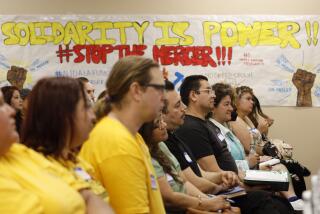Role of Feudal King Doesn’t Serve AFL-CIO
Delegates mustering in Los Angeles for the AFL-CIO convention this week will be set on having a good time--the sacred duty of all conventioneers with any sense of tradition. Then, amid the parties, they’ll consider labor’s agenda. A prime item is a proposed reorganization, which aims to give the national AFL-CIO greater control over the state federations and central labor council.
Proponents of the shake-up, the first in nearly half a century, argue that the task of revitalizing organized labor requires this sort of shift in power toward Washington headquarters, now ruled by John Sweeney, a man pledged to get labor on the move again. Adversaries fear that the plan would make it easier for Washington to crush any independent local initiatives that lie outside or threaten the strategies decreed in Washington.
It’s necessary to have a certain realism here. An experienced labor reformer once told me that the best way to think of the movement was in terms of feudalism. At the center, he said, is the king--the president of the AFL-CIO. Then there are the dukes--the presidents of unions and state federations, all jealous of their powers and resentful of any interference or usurpation of the ancient rights. In return for respect for their own turf, they render fealty and dues to the king.
Of course, any strong king, particularly one intent on eroding the power of feudal barons resistant to change, seeks to build alternative centers of power. Thus, in his early days, Sweeney looked with hope to the central labor councils--of which there are some 600--as places where energetic souls could build useful coalitions and try to combat institutional inertia.
There’s general agreement now that one can count the number of vigorous central labor councils on the fingers of one hand. So if most central labor councils are mere shells, or just a phone in someone’s house; if the presidents of state labor federations are mostly dinosaurs fearful of change and dedicated mostly to preservation of their power, why shouldn’t those delegates in Los Angeles shout “hurrah” to Sweeney’s plan to restructure?
In truth, a shake-up is needed. The key players here are the presidents of the international unions. Sweeney would like to see them throw more of their resources and clout into the state federations, which do very little and which have not responded to his call to action.
The proposed reorganization is in part a confession of impotence on Sweeney’s part. There’s no doubt that the new regime put heart into people forlorn after years of inertia and defeat in the Lane Kirkland years, and this optimism was fortified by the role organized labor played in throwing the Republicans back on their heels in the 1998 elections. But in terms of the organizing efforts that have been Washington’s priority, the record has been patchy. And there have been serious defeats, like the the huge effort by the United Farm Workers--heavily backed by the AFL-CIO--to organize strawberry workers in Watsonville.
If the fundamental task of any labor movement is to improve the lot of workers, how much of an upswing has there been in real wages in the newfound prosperity? Tight labor markets and two increases in the minimum wage boosted real wages, not Sweeney’s “new labor.” Consider some numbers. The overall weekly wage for nonsupervisory workers went up 4% between 1997 and 1998; for nonunion workers, the rise was 4.4%; for union members, 3%.
In the feudal world depicted above, the eternal spirit of resistance comes from the peasants and from local organizing efforts, such as those that sparked the campaign that gave 5,000 workers their great victory this summer at Fieldcrest Cannon in Kannapolis, N.C. There’s often a conflict between such local uprisings and what the AFL-CIO leadership decrees as a national agenda.
At the end of November, the eyes of every labor militant will be on Seattle, where the central labor council has been organizing protests against a meeting of the World Trade Organization. However, the AFL-CIO has been distancing itself from any strident protest, and next year will be throwing its efforts behind the Democratic nominee. The current prime contenders, Al Gore and Bill Bradley, are proclaimed friends of labor and passionate believers in the WTO.
With this contradiction in mind, the only thing that matters with the shake-ups now being contemplated is whether they afford greater opportunity for the grass-roots militancy that is the lifeblood of any effective labor movement.
More to Read
Inside the business of entertainment
The Wide Shot brings you news, analysis and insights on everything from streaming wars to production — and what it all means for the future.
You may occasionally receive promotional content from the Los Angeles Times.










